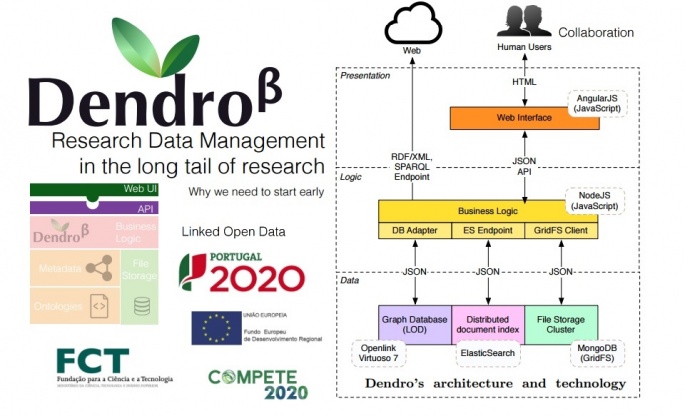DENDRO : Collaborative Research Data Management Platform. A Semantic Wiki built on Triple Store
28/11/2016


The DENDRO platform is an open-source platform designed to help researchers describe their datasets, fully build on Linked Open Data. Whenever researchers want to publish a dataset, they can export to repositories such as CKAN, DSpace, Invenio, or EUDAT's B2SHARE.
“Research data management is rapidly becoming a regular concern for researchers, and institutions need to provide them with platforms to support data organization and preparation for publication” (A comparison of research data management platforms: architecture, flexible metadata and interoperability).
“It has been shown that data management should start as early as possible in the research workflow to minimize the risks of data loss” (The Dendro research data management platform).
______________________________________________________________________________________________
DENDRO was launched (in 2013) by the Information Systems Research Group: InfoLab, at the University of Porto, as a technical collaborative solution to provide researchers with an integrated, qualitative research data management environment.
Using DENDRO open source environment, researchers can collaboratively create metadata for their research datasets, and to manage them already at the early stages of the research workflow.
The architecture of DENDRO combines an easy to use file manager (similar to Dropbox) with the collaborative capabilities of a Semantic Wiki enabling the creation of semantic metadata records (built on the basic elements/fields such as title, author, date, description, location, etc.).
An extensible, triple store-based data model underlies the description of datasets from different research domains and allows on-demand metadata descriptor selection by the user. By employing OpenLink Virtuoso, which is at the core of the data layer of this model, each resource can have an arbitrary set of metadata to be exposed on the Web and queried through Virtuoso’s SPARQL endpoint.
Data curators can expand the platform’s data model by designing (using tools such as Protégé) and loading ontologies specifying domain-specific or generic metadata that can be used by researchers for dataset description in their projects. These ontologies can then be shared on the web to document the descriptions, and re-used by others in the DENDRO instances that they manage.
LabTablet, a semantic metadata collection on a multi-domain laboratory notebook, helps researchers to generate metadata records by using the mobile device’s on-board sensors. These metadata can be further uploaded to a DENDRO instance for collaborative editing.
DENDRO is designed as an user-friendly interface for users without data management knowledge. Users need only to choose the properties of metadata/descriptors with the right semantics, without being concerned with design and implementation issues that arise from ontology use.
After datasets are described, they can be packaged, associated with research publications they support and sent to a research data repository, where they go through the deposit workflows.
To make these latter as easy as possible for researchers, DENDRO focuses on interoperability. DENDRO’s extensive API makes it easy to integrate its workflows with external systems such as: as CKAN, DSpace, Invenio, EUDAT's B2Share, Zenodo, Figshare. Actually, any repository can be added by writing small plug-ins.
As DENDRO users interact with the system, they are actually building a Linked Open Data graph of interconnected research-related resources, while data access is performed internally via SPARQL all across the platform.
DENDRO is considered to be “an effective practical application of semantic web technologies, as well as a catalyst for the creation of domain-specific lightweight ontologies” (Dendro: collaborative research data management built on linked open data).
Check out HERE for two installation videos for DENDRO using the Vagrant installation scripts:
I. installation is aimed at the normal users who just want to try out DENDRO in their own computers;
II. installation is aimed at developers who want to quickly setup their development environment to contribute to the platform.
You are free to use DENDRO to build any service for your research group or institution; all source code is freely available under a standard BSD 3-Clause license.
______________________________________________________________________________________________
Sources:
The DENDRO research data management platform (article)
The DENDRO research data management platform (slides)
Updates about DENDRO platform on GIThub
